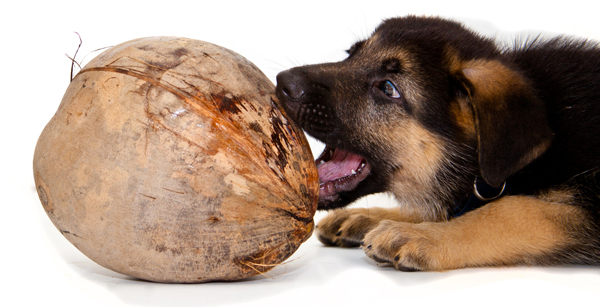 |
| Male and Female Mearn's Quail. S. AZ |
 |
| One mornings bounty. |
 |
| Wally and Stormy |
 |
| Me with a Scaled (Blue) Quail - SE NM |
 |
| Perfect Blue Quail habitat |
 |
| More Perfect Blue Quail Habitat |
 |
| (Photo by Nancy Whitehead) We made a pretty good team, the old boy and me. |
I'm a big believer in good nutrition as the foundation for good performance, longevity and health. It's just as important for my dogs as it is for me. I've settled on my dog food brand of choice (Royal Canin Medium and Trail 4300) and I'm continually looking for any additives that might benefit my canine buddies. My wife discovered the benefits of Coconut oil in her diet a few years ago. So, I started studying the "goods and others" for use with dogs.
I found a few articles that interested me. Below, you will see excerpts with links to the full articles. I encourage you to access the link and read it all.
From Dogster:
Fed regularly to pets, coconut oil can have many health benefits — for their skin, digestive and immune systems; metabolic function; and even their bone and brain health!

Is Coconut Oil Good For Dogs:
Can dogs have coconut oil? The short answer is Yes. Coconut oil is good for dogs and can help aid your pets' digestion, improve their coats, help prevent infection and more. But please note, it is important to follow the proper guidelines. As with most things, too much of even a good thing can end up having negative effects.
Why Is Coconut Oil Healthy For Pets:
The big benefits of coconut oil comes from the type of fats it is made of. Coconut oil is almost exclusively (more than 90%) saturated fat and is one of the few foods that can be classified as a "superfood". I know what you're thinking, "Isn't fat bad for you?". In this case no. There are two groups of fats: saturated fats and unsaturated and within each group are several more types of fats. It can get a little confusing, for solid information all about fats, WEBMD has some good information.
MCT's are coconut oils secret weapon. Medium chain triglycerides (MCT) is good fat, the kind that provides an array of benefits which include digestion improvement, immune system support, metabolic function that assists with weight loss, skin and coat health and thyroid health.
MCT is made up of Lauric Acid, Capric Acid, Caprylic Acid, Myristic Acid and Palmitic. Coconut oil also contains about 2% linoleic acid (polyunsaturated fatty acids) and about 6% oleic acid (monounsaturated fatty acids).
Lauric acid has antibacterial, antiviral, and anti-fungal properties. Capric and caprylic acid also have similar properties as lauric acid and are best known for their anti-fungal effects
In addition, MCTs are efficiently metabolized to provide an immediate source of fuel and energy, enhancing athletic performance and aiding weight loss. In dogs, the MCTs in coconut oil balance the thyroid, helping overweight dogs lose weight and helping sedentary dogs feel energetic.
Ok enough of the science, now on to the fun stuff.
Benefits of Coconut Oil for Dogs
As we've stated, coconut oil has several benefits for your dog. Let's go over a few of them. Coconut oil gently elevates the metabolism, provides a higher level of energy and vitality, protects your dog from illness, and speeds healing. As a bonus, coconut oil can improve dog’s skin and coat, improves digestion, and reduces allergic reactions.
HEALTHY SKIN & COAT:
IMPROVES DIGESTION:
"SUPERFOOD" BENEFITS:
How Much Coconut Oil for Dogs
How much coconut oil should you give your dog? When starting your dog on coconut oil, it is absolutely vital that you start slow. Begin slow, start with a tiny amount. Your dog needs to take time for their body to adjusts to the addition to their diet. If you start with larger amount of coconut oil, your dog could react poorly. Side effects can include diarrhea or greasy stools.
Start with Small Amounts:
After you've let their body adjust, a general guideline for the optimal dose of coconut oil for dogs is:
Again, DO NOT start with these amounts in the beginning!
Coconut Oil On Dog's Skin
In addition to giving your dog orally, coconut oil can be applied directly to your dogs coat and skin. As we stated earlier, because coconut oil contains lauric acid, it is a fabulous immune builder, both orally and topically.
A coconut oil treatment will leave your dog's skin incredibly soft, but it will also make it healthier. A coconut oil skin treatment about once a week can make a big difference in the health of your dog's skin and nails.
For good results, apply to the skin and let the oil absorb for about five minutes. After the five minutes, you can apply and a very light rinse. If you feel you haven't removed the excess oil, finish up with a light application of shampoo and another quick rinse.
Coconut Oil For Dogs Side Effects
Your dog may experience some side effects from coconut oil. Generally this happens if you give too much coconut oil to your dog too quickly. We recomend that you start slowly and see how your pet reacts. The most common side effects for your dog can include diarrhea or greasy stools.
http://www.sitstay.com/blog/coconut-oil-for-dogs
We are using coconut oil for all our dogs. My dogs and her dogs. We have seen an increase in skin Sheen and energy level. The dosage amount is about 1 tablespoon per dog. The oil is a liquid when it is about 75°F. We put it in the squeeze bottles and keep it near the dog food, it is very easy to apply. As I get into hunting and trialing season, I expect to see more benefits from its use.
 | |||||||||||||||
| Lewis Dog Boots |
 |
| Bark'n Boots, Grip Trex |